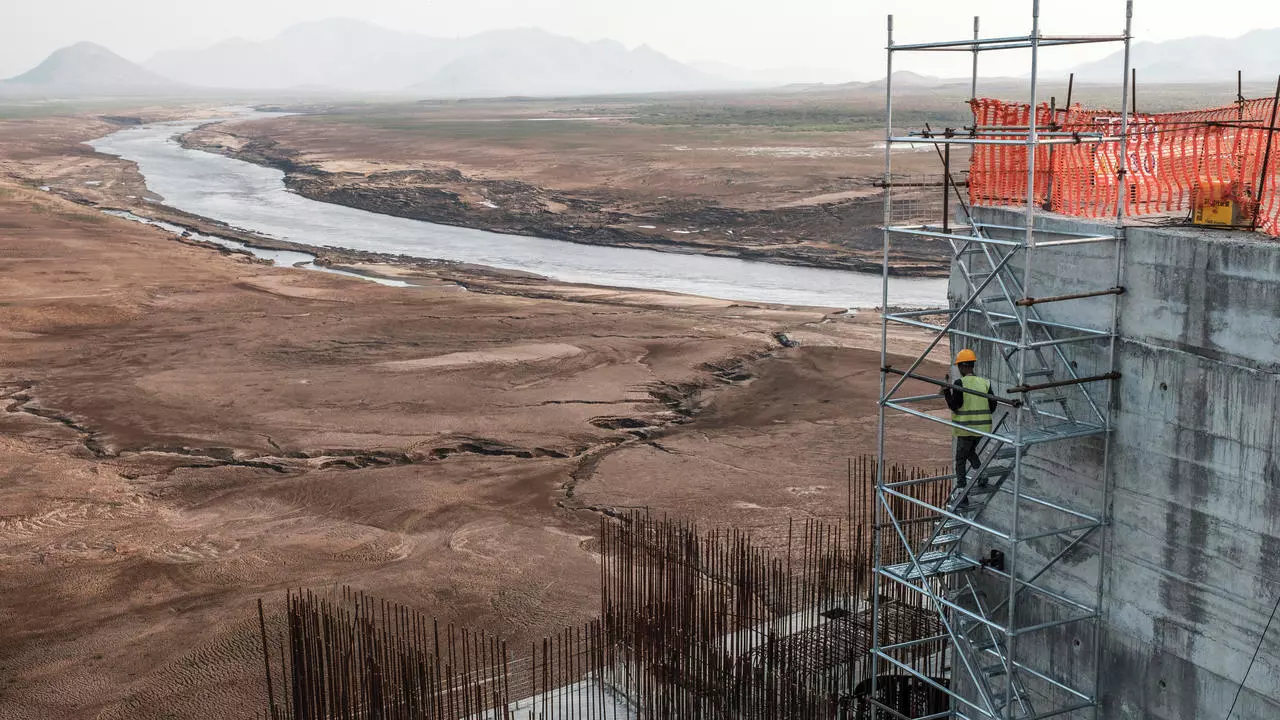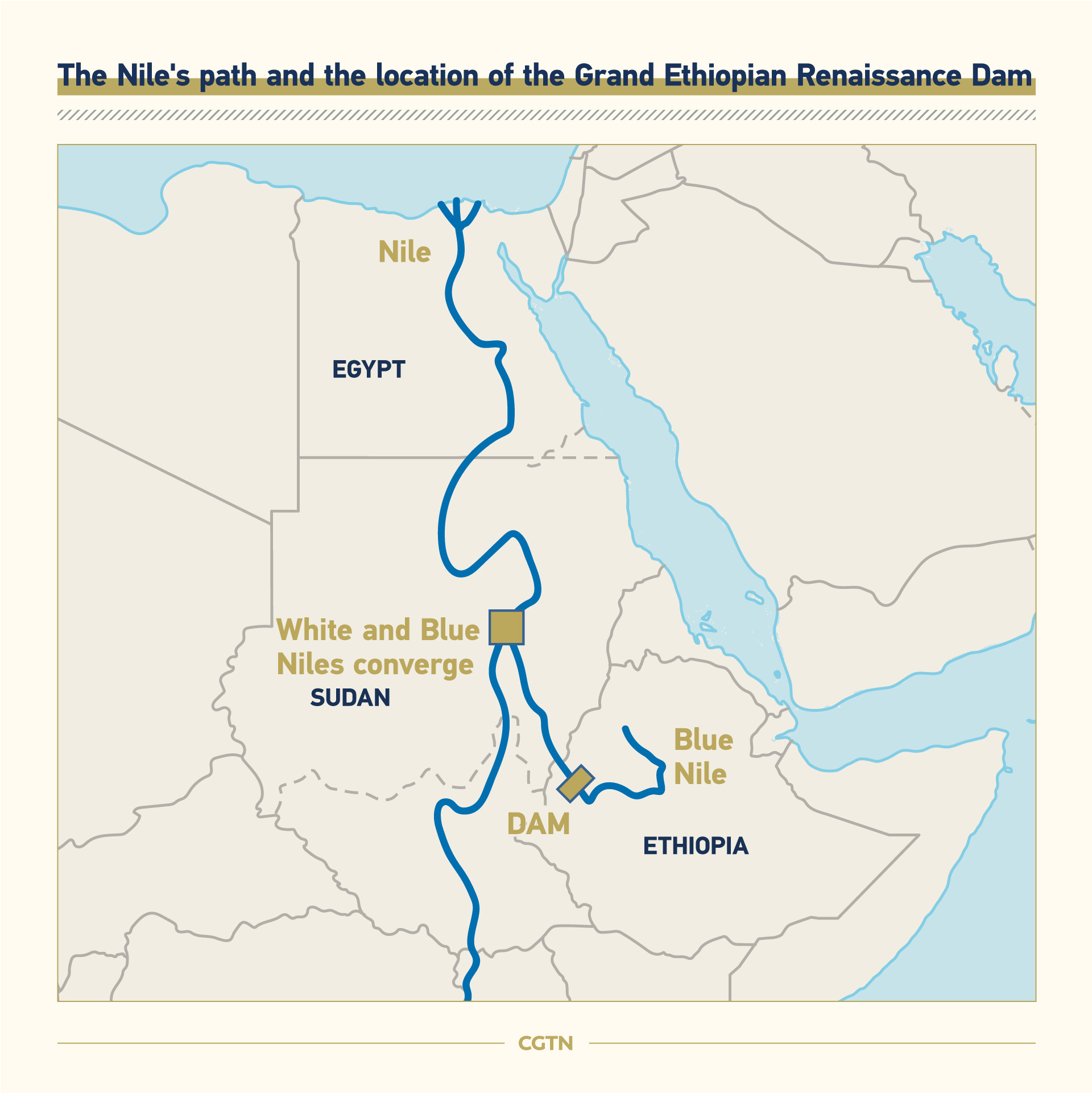
The Grand Ethiopian Renaissance Dam pictured under construction in December 2019. /AFP
The Grand Ethiopian Renaissance Dam pictured under construction in December 2019. /AFP
The United Nations (UN) on Monday urged Egypt, Ethiopia and Sudan to "work together" to resolve differences over Addis Ababa's Nile River mega-dam which has been a long-running source of regional tension.
The League of Arab States Council ministerial meeting due to be held on Tuesday, at the request of Egypt, would tackle the file of the controversial Grand Ethiopian Renaissance Dam (GERD) and the turmoil in Libya, said Egyptian Foreign Minister Sameh Shoukry on Monday.
Recent talks failed to produce a deal on the filling and operation of the GERD, which will be the largest hydro-power plant in Africa.
"We urge Egypt, we urge Ethiopia and Sudan to work together to intensify efforts to peacefully resolve outstanding differences," UN spokesman Stephane Dujarric said during his daily press conference.
Dujarric also recalled "the importance of the 2015 Declaration of Principles on the dam" that stressed the need for cooperation based on good faith, international law and mutual benefit.
According to a diplomatic source, the Security Council session was not anticipated to produce a resolution, as council members were expected to refer only to letters sent by the three nations to the UN explaining their concerns.
Both Khartoum and Cairo fear the 145-metre-high dam will threaten essential water supplies once the reservoir starts being filled.
But Addis Ababa says the dam is indispensable for its development and insists Egypt's water share will not be affected.
Sudan, where the White and Blue Niles converge, on Sunday had warned against escalation and urged further negotiations over the dam after the previous ones failed.
Ethiopia has declared plans to start filling the dam next month, regardless of whether a deal is reached. The dam is more than 70 percent complete and promises to generate much-needed electricity for the country.
Egypt views the hydro-electric barrage as an existential threat, as the country gets about 97 percent of its freshwater needs from the Nile.

The latest talks, which had started on June 9 via video conference, followed a previous round of negotiations in Washington, which ended without agreement in February.
On Saturday, Egyptian President Abdel Fattah el-Sisi recalled that in a speech he gave to the Ethiopian parliament five years ago he said that while Egypt respects Ethiopians' need for development, they should also respect its needs for "life."
On Friday, Cairo urged the Security Council to intervene, citing Ethiopia's "non-positive stances."
"When we resorted to the Security Council ... it stemmed from our keenness to take the diplomatic and political path until the end," el-Sisi said.
The Nile is a lifeline supplying both water and electricity to 10 countries it traverses.
A regional power struggle
The border between Sudan and Ethiopia has seen serious clashes and unprecedented escalations over the past month, which sparked questions about its impact on the GERD negotiation track.
A Sudanese officer was killed and several civilians and military officers injured in clashes between the Sudanese forces and an Ethiopian militia in Sudan's al-Fashqa region on May 29. The Sudanese army officially accused the Ethiopian forces of backing the militia and warned of a full-blown war between the two countries.
The territory dispute nudged Sudan further towards the Egyptian side. Meanwhile, Sudan also expressed reservations on Egypt's draft resolution calling for Arab support on the Nile dam issue, which Egypt submitted to the Arab League.
On March 5, Egypt proposed a draft resolution to the Arab League to express solidarity with Egypt and Sudan in the GERD issue in order to preserve their interests. Sudan later refused to stand with the proposal citing conflict of interests.
(With input from agencies)